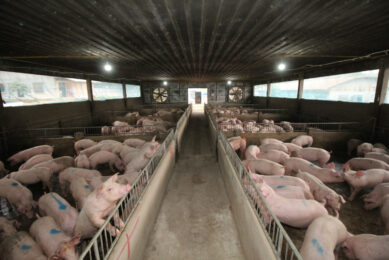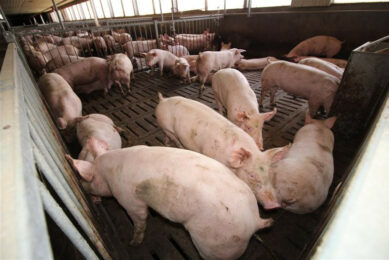Keeping ASF out: The Fortress Farm

As African Swine Fever continues to make more victims in China, it is wise for any pig farmer worldwide to know how to be prepared as well as possible, should the virus ever travel on. Pig management expert John Gadd continues where he left off – and gives a long checklist.
In the previous article, I reminded that African Swine Fever (ASF) is all about contact. Remember, the operative word in preventing ASF from entering your business is freedom from contact. That is why I introduce the ‘Fortress Farm’ concept.
The Fortress Farm: What to keep in mind?
• Who visits the farm? Anybody? Keep them away as far as humanly possible. One exception – I gave advice on allowing-in the pig vet in my first article.
• How do you accept any deliveries – food, pigs, packages, etc.? Again advice in last article.
• Replacement stock needs strict discipline. Does your vet liaise with the vendor? Do you quarantine? Far away enough? Long enough? Inspect twice a day? An agreed disposal procedure in place for rejects? Buy only from one accredited source. Never ever from markets.
• Deliveries of selected replacement stock and food. Have you made it clear to all involved in regular deliveries to your premises that you insist that they follow your protocols, and that the continuation of your business will depend on it.
• Find out how often they sanitise their delivery vehicles – a good indicator of their seriousness in their controlling the spread of disease.
• Discipline is needed by the suppliers of replacement stock. But the impetus – as with food deliveries – must come from the farmer himself. He, as the customer, must make clear to the supplier that no vehicle should be accepted without a form/certificate that the vehicle has been properly cleaned and disinfected – inside and out – before calling at the farm. This is not done as far as I am aware, in any of the localities where ASF is in progress, such as China where ASF is spreading fast.
• Do not allow sales reps on to your farm. Much friendly negotiation can be done these days by laptop or visual phone; failing this, in a pub or cafe off the farm. A visual laptop can be used to show the on-farm situation if a problem with food, ventilation, heating, water supply or equipment failure is involved.
• Those involved often do not necessarily need to visit the farm these days. As a farm advisor I use these visual facilities frequently myself and have halved the need to visit to give advice and solve problems, thus making better use of my limited time; reducing my costs and your expenses.

Read more about African Swine Fever in the Health Tool
• Do you have a locked perimeter fence with call bell and telephone? More than this – all delivery bulk food should be blown into receiving bins on the perimeter, not inside the farm. The same with deliveries of other materials and goods – create a perimeter outstation.
• Consider your farm as a fortress isolated from any outside direct contact. This takes courage, some expenditure, and discipline. Avoiding contact with as many of the proven disease vectors as possible has to be your mantra for the future. Think ‘contact’ in anything you do or are asked to do by us advisors – how can you reduce contact, if needs be by foregoing what is convenient to you and others?
• Shower-in/shower-out is in my opinion probably overrated, but continue until it is proved to be so. The quality of these facilities is too low on many farms I visit; for example they must be supported by an on-farm laundry service.

What else can be done to keep ASF at bay?
• Once the outside defences of the ‘fortress’ are established, there is a need these days for an inner ‘ring’. The first line of defence against any disease is to learn about immunity and how you can influence it so as to enable the pig to build up its own defences against pathogens. You can markedly assist nature in this respect. And it does not cost much in relation to the benefits a correct immune status provides. Let nature help you.
• The second line of internal defence is to distinguish between a detergent and a disinfectant. The detergent is equally important to a disinfectant. I am beginning to suspect that an approved detergent and its proper use is even more important than disinfectants, despite the disproportionate attention disinfectants get in the press. Any disinfectant needs help to reduce the numbers of viable numbers of pathogens on pig-contact surfaces so as to allow a sufficient kill by the disinfectant to permit the pig`s natural immunity to take over.
• Lastly and of course for common sense reasons, do not visit areas where ASF is in progress. If by accident you do, then complete cleaning of all the garments on you and in your baggage is essential.
My final article on ASF is my suggested layout of what a ‘fortress farm’ should look like.











